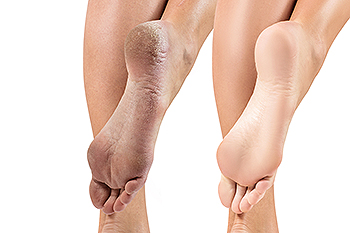
There are many reasons why the skin on the heels may crack. These can include wearing open backed shoes, standing on uneven surfaces, or not drinking enough water. Additionally, there may be medical conditions that can cause cracked heels, such as diabetes, eczema, or psoriasis. Some people may develop cracked heels from soaking in a bath for long periods, using harsh soap, or possibly from taking extremely hot showers. Patients who are obese may experience this condition as a result of the added weight the feet must endure. Cracked heels may be prevented by washing and drying the feet daily, followed by applying a good moisturizer on them. It is beneficial to drink plenty of water each day, in addition to incorporating healthy foods into your eating regime. Flip flops and sandals are best for the feet while worn in beach and pool areas, but closed shoes can provide better protection while pursuing other activities. If you have cracked heels, it is suggested that you seek the expertise of a podiatrist who can offer you treatment options, which may include prescribed medicine.
Cracked heels are unsightly and can cause further damage to your shoes and feet. If you have any concerns, contact Sarah Urton, DPM from Kitsilano Foot and Ankle Clinic. Our doctor can provide the care you need to keep you pain-free and on your feet.
Cracked Heels
Cracked heels appear unappealing and can make it harder for you walk around in sandals. Aside from looking unpleasant, cracked heels can also tear stockings, socks, and wear out your shoes. There are several methods to help restore a cracked heel and prevent further damage.
How Do You Get Them?
Dry skin is the number one culprit in creating cracked heels. Many athletes, walkers, joggers, and even swimmers suffer from cracked heels. Age and skin oil production play a role to getting cracked heels as well.
Promote Healing
Over the counter medicines can help, especially for those that need instant relief or who suffer from chronic dry feet.
Wear Socks – Wearing socks with medicated creams helps lock in moisture.
Moisturizers – Applying both day and night will help alleviate dryness which causes cracking.
Pumice Stones – These exfoliate and remove dead skin, which allows for smoother moisturizer application and better absorption into the skin.
Change in Diet
Eating healthy with a well-balanced diet will give the skin a fresh and radiant look. Your body responds to the kinds of food you ingest. Omega-3 fatty acids and zinc supplements can also revitalize skin tissue.
Most importantly, seek professional help if unsure how to proceed in treating cracked heels. A podiatrist will help you with any questions or information needed.
If you have any questions, please feel free to contact our office located in Vancouver, BC . We offer the newest diagnostic and treatment technologies for all your foot care needs.
